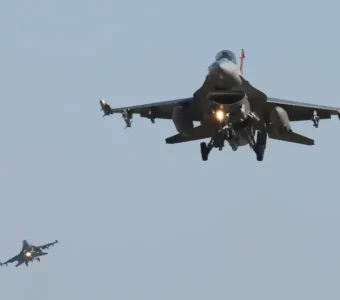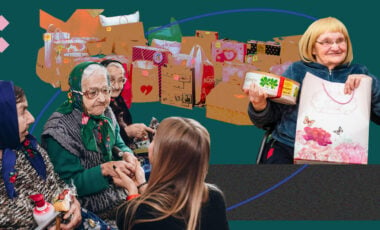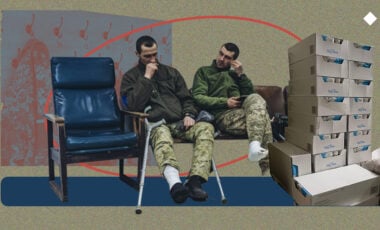Where resilience lives: Inside a Ukrainian military hospital

This story started with my trip to Lviv to visit my friend of nearly 10 years. He has been giving me a real insight into life in Ukraine, and all that entailed, air attacks, the loss of friends, and life-changing injuries to a close relative. He works tirelessly in his job as a printer, but perhaps more remarkable is the work he does for no reward, to help in many ways, his fellow citizens and organisations that defend Ukraine.
Before I left England, one of the messages I received from him was how he'd bought dozens of t-shirts for soldiers recovering in one of the multiple hospitals in Lviv used for military personnel. I literally followed suit and packed a case with as many socks, boxer shorts, and t-shirts as my luggage allowance would allow. These clothes were simply a donation, I was just expecting my friend to organise what to do with them, I didn't know they would lead me to my destination, the quiet, dimly lit corridors of a military hospital.
He sent me directions to the Communal Municipal Clinical Hospital 8. The air was thick with the sterile scent of antiseptic, yet it could not mask the underlying presence of something deeper, resilience, pain, and an unspoken camaraderie among the injured soldiers I was about to meet. Some were too ill or too tired to interact, others greeted me with humour, with a shine in their eyes. As I walked through each ward, accompanied by volunteers who had made this work a large part of their lives, I realised that this is a war that is not only fought on the frontlines, but everywhere, in recovery rooms, in whispered conversations, in the quiet defiance of those refusing to be broken.
Stories of soldiers

A Polish volunteer, "Pavel," had signed up twice already for the Ukrainian Defence Force, with his brother and a couple of Polish friends; he could not wait to recover and rejoin his comrades. "Taras" had severe leg injuries, and after multiple operations and skin-grafts, was hoping to recover in time to walk his fiancée down the aisle at their wedding. 'Vitaly' showed me a video on his phone of the immediate aftermath of stepping on mine and a grenade attack. I remember "Andriy," who needed a narrower wheelchair so he could negotiate the narrow doorframes of his home. Like me, a fan of the UK musician Ren, we discussed how this music helped him through his experiences.
The stories were ones of optimism, determination, recovering from physical injury, and in finding different ways of overcoming the traumatic experiences. The individual motivations towards rehabilitation differed, from getting married to going fishing again. Many of those I spoke to were adamant they would return to the fight as soon as possible, in any possible way. Together with the undeniable sense of unity and strength of spirit, I was amazed by the openness and passion in the individuals I spoke with. Suddenly, and despite being an outsider, I was witness to the reality of an ongoing and constant struggle.
Volunteers: unsung heroes
Immediately, I was struck by the urgency, the speed at which everything moved. There was no hesitation, no wasted motion. On my visit, eight volunteers worked with quiet precision, their roles fluid yet instinctive. Olya and Anastasiia took a moment to introduce themselves and kindly offered to translate for me, but even as we spoke, they remained in constant motion, their hands sorting, lifting, passing.
Both Olya and Anastasia have their regular lives, working, spending time with family and friends. Both, nevertheless, find time to help others. When the full-scale war began, Olya helped displaced people in Warsaw, then delivered body armour and medicine to the front, later started visiting the hospital to see the guys with injuries, and to this day, she continues to do this. Anastasiia says she helps more with donations and humanitarian aid if there is a need. Sometimes she will go to the guys in the hospital.
As we talked about the hospital, around us, the others moved swiftly, efficiently organising clothing, stacking bags of toiletries, sorting boxes of snacks and small comforts that, in a hospital ward, meant more than words ever could.
Some ducked in and out of rooms, arms full, disappearing down corridors before returning with empty hands and going straight for the next bundle. There was no ceremony, no pause for recognition, just an unspoken understanding that every second counted. I had come expecting to help, yet I found myself simply trying to keep up.
It was only when we finished, when the hospital bed that had been used as our supply cart stood nearly empty, that I checked the time. More than three hours had passed in what felt like an instant. No one had stopped to glance at a clock. The work had its own rhythm, dictated not by the volunteers but by the needs of the wounded. Olya tells me, "And this is only one hospital, we go to one with eight floors, nearly twice as big."
Just one hospital?
It hit me that the scale of their task is immense, yet never insurmountable. Anastasiia told me, "I don't think that I'm doing anything extraordinary."
But this is, indeed, extraordinary. They return, day after day, because they understand that their effort, however small it may seem, is part of something larger. In the quiet moments, when a soldier grips a volunteer's hand in gratitude, when a familiar face returns with fresh supplies and a warm smile, the weight of sacrifice is not borne alone. The volunteers do not carry weapons, but they fight in their own way, meeting courage with commitment, suffering with solidarity.
Reflections
I hadn't expected to be there that day, and perhaps that made the experience all the more profound. I was lucky to have been given this insight, not just from an academic perspective (I had just gained a M.Sc. in psychology specialising in military PTSD and trauma therapy), but on a deeply personal level. I was unsure of whether writing about my trip and sharing my experience was the right thing to do. I know from my knowledge of different trauma treatments that articulating the emotions and effects is therapeutic and healing. This is good for the individual, but is it helpful for me to be broadcasting these things? What I do know is that seeing these moments of quiet resilience up close, witnessing the relationships between those who give and those who endure, left an imprint on me. In this shared struggle, the lines between patient and volunteer blur. What remains is a testament to the simple, unyielding power of togetherness.
My decision to write about this was made because the psychological strength and resilience of the soldiers and volunteers are not sufficient alone. It must be met with sustained support, funding, resources, and recognition from the wider world. I hope this goes some way towards raising awareness of the requirements of the situation, now and in the future. Their courage and sacrifice deserve more than our respect and admiration; they demand action, whether through direct aid, advocacy, or simply refusing to look away. In war, resilience is not just found on the battlefield but in the unseen, tireless efforts of those who care, who give, who refuse to let suffering go unanswered. And in that, there is hope, not just for survival, but for something enduring, something unbreakable.



















































